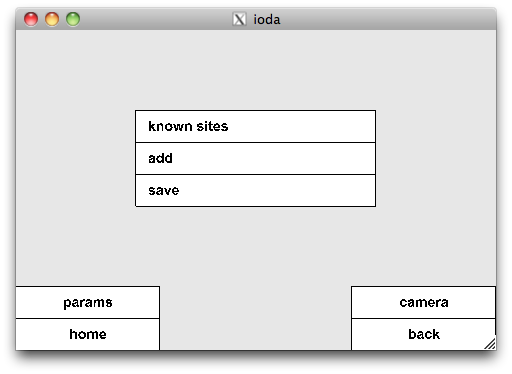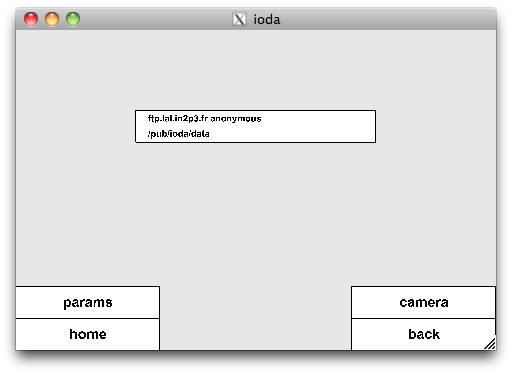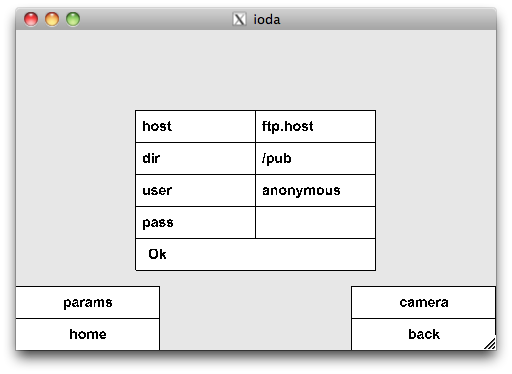The "files" menu item shows files of the "document directory" whose types are known by ioda. According to the platform, the document directory is :
UNIX : ~/Documents/ioda
Windows : C:\Documents and Settings\<user>\Documents\ioda
Android : /sdcard/Android/data/fr.in2p3.lal.ioda
iOS : <app dir>/Documents.
The known file types are :
.fits : cfitsio files.
.aida[.gz] : aida files.
.root : files at CERN/ROOT format.
.jpg : jpeg files.
.fog : CEA/Saclay povama files describing the LHC/ATLAS
sub detectors. With the courtesy of L.Chevalier,
C.Baudry, Marc Virchaux.
iOS
Since version 1.1 ioda is complient with the Apple document interchange for file types known by ioda. Then applications as Dropbox, GoodReader, Mail can "Open in..." a file toward ioda. (Strangely it does not work with all file types from Safari. But it seems to be a common problem...) With this feature and the "FTP button" (see The FTP button) you can get data files without the need to connect your iOS device to a desktop.
From a Mac, as ioda had been declared as a "File Sharing" application, you can send data files from a Mac on a connected iOS device by :
connecting it to a Mac
launching iTune
choose the device in the DEVICES list on the left
choose the "apps" tab in the central panel
choose ioda in the list of "File Sharing" apps
use the "add..." button to send files on the device
Today iTune can't send a directory. Something which is needed, for example, to send a FOG directory containing the ATLAS .fog files. But you can do that by installing and using on your Mac the free "iPhone Explorer" application. After having launched iPhone Explorer on your Mac, drag the wanted directory from the Mac Finder onto the Documents directory of the device seen within the iPhone Explorer tree.
Android
Since 1.1 ioda should appears as a candidate viewer when choosing a file in Dropbox or from the "Linda Manager" file manager application. (But it is not proposed as a candidate viewer from the "My Files" application on our device under Android 2.1). With this feature and the "FTP button" (see The FTP button) you can get data files without the need to connect your device to a desktop.
From a desktop you can nicely "push" files on a connected device by using on your desktop the "adb" tool coming from the Android SDK :
<source setup adb>
adb push <file> /sdcard/Android/data/fr.in2p3.lal.ioda/.
You can use also some free FTP app as the AndFTP one to get data files.
Note that some files, as the CEA/Saclay .fog files, could be found under the download/data area of the web site.
The FTP button
Since version 1.1, there is a "FTP button" in the main menu that leads to a FTP panel that permits to get data files with the "good old FTP" :

"know sites" leads to a list of sites declared to ioda :

By default the LAL anonymous ftp site is proposed. It points to the /pub/ioda/data "primary directory". This site permits to get the template data files used to describe the feature of ioda in the web pages. After having choosen a site, you are lead to the list of files and sub directories of the declared "primary directory" of the choosen ftp site. Then navigate in the file system structure to choose and bring a file. The file is put in the ioda document directory. When done the file should be visible from the "files" system of the main panel.
By using the "add" panel :

you can declare a site of your own. You have to enter the host address, a primary directory on the host and if not "anonymous" a user account and a password. When done (by using "Ok") the new site should appear in the list of "known sites". You can use the "save" item to save sites in a ioda.ftp file in the document directory. If restarting ioda, this file is read to present the list of sites found in it in the "known sites" list. The ioda.ftp file is at the XML format. If you prefer, you can edit straight one of your own and deposit the file in the document directory of ioda. As a template we show the default ioda.ftp file :
<ftps>
<ftp>
<host>ftp.lal.in2p3.fr</host>
<dir>/pub/ioda/data</dir>
<user>anonymous</user>
<active>false</active>
</ftp>
</ftps>
A site is the set of :
- host
- directory
- user (if not anonymous)
- password (if a user is given)